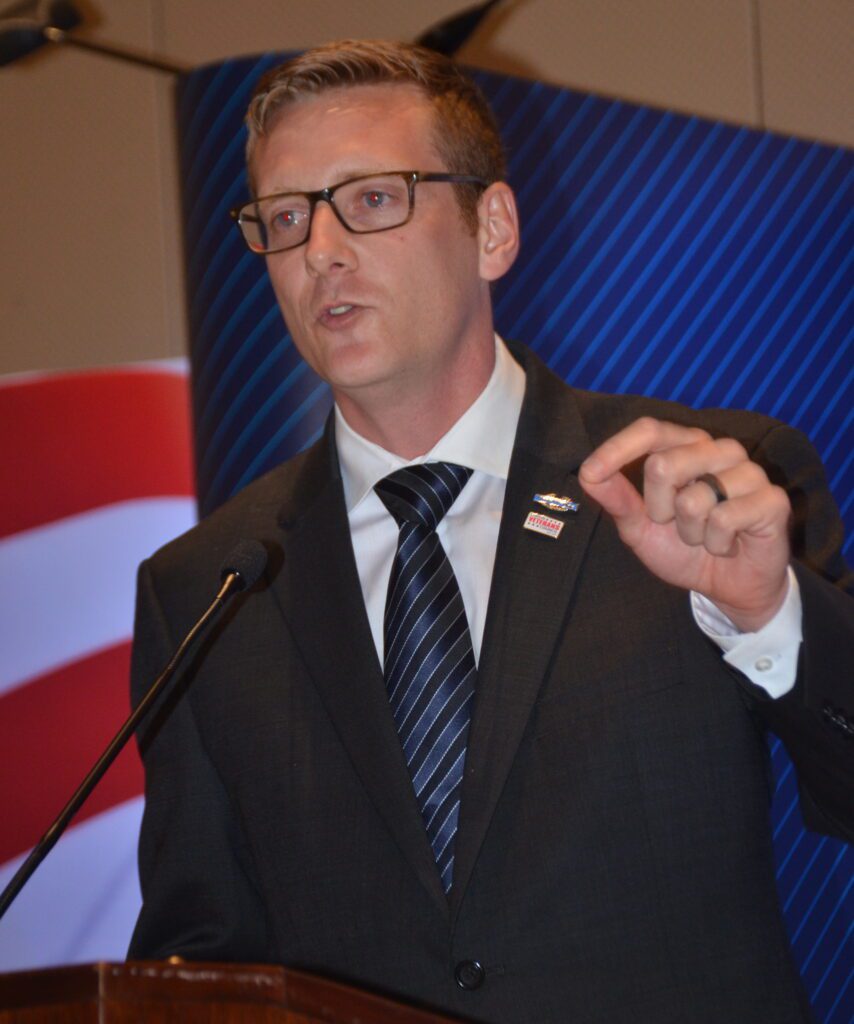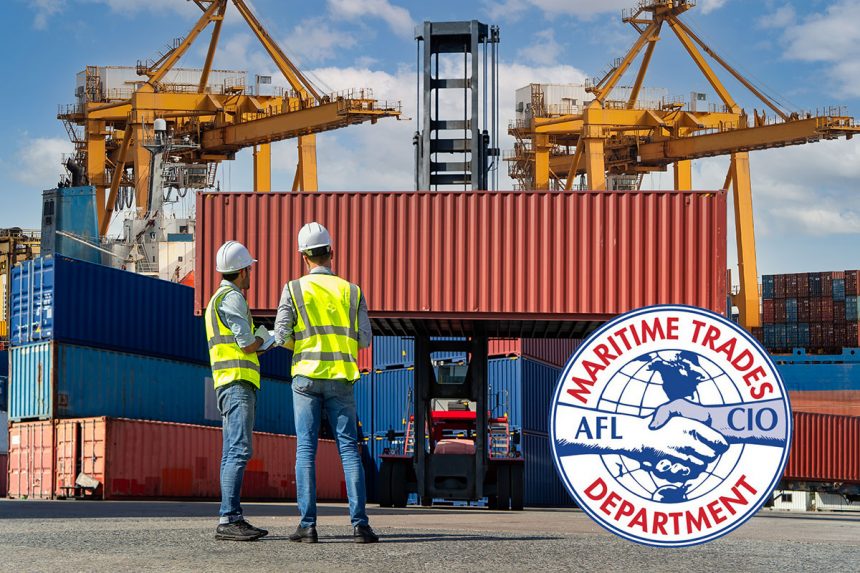
Will Attig, the executive director of the Union Veterans Council, AFL-CIO (to which the Maritime Trades Department is a charter affiliate), used his time at the MTD Executive Board meeting to speak on the importance of supporting and enabling working veterans though union membership and grassroots activities.
An Army combat veteran, Attig began by thanking those assembled for unanimously voting to adopt a resolution which supported troops and veterans. He said, “Labor has a strong history that runs hand in hand with our veterans community. We trace our original unions in America to Civil War veterans coming home to major cities after fighting together to preserve this nation, and banding together for another fight, and that was workers’ rights.”
He continued, “It’s no surprise that in 2019, in 15 states, veteran union density is over 18 percent. That’s something to be proud of…. And the highest number of veterans in unions, the industry that represents the most, is the transportation industry, and I think you all need a round of applause for that.”
Next, he asked the audience, “What’s the most important thing that a union gives to you? Or, if you’re an industry person who’s here to support our workers, what does having a stable job with good benefits mean to you?” He then played a video featuring union veterans describing their union experiences.
“Right now, there are 1.2 million active working veterans inside of Labor,” said Attig. “And they’ve reaped the benefits of what we do in rooms like this every single day, by being able to provide a stable, gainful life to their families, and achieve the American Dream they went and fought for.
“When I sum up what being in a union means to me, it’s dignity,” he continued. “It’s the ability to live out my life, enjoy it, work hard for my country that I fought for, and be stable.”
He told the board and guests that when he grew up he got one pair of new shoes each fall that were supposed to last until the next school year started. He stated he learned dignity by serving in the Army and earning the rank of staff sergeant. He felt that dignity being chipped away when he came home and couldn’t keep up with the payment for a truck he purchased while serving. Through a friend, Attig learned about “Helmets-to-Hardhats” (the Building Trades equivalent to “Military-to-Maritime”) and became a welder and member of the MTD-affiliated United Association in southern Illinois.
Unions make a difference for veterans in many ways, he said, not the least of which is fighting for and securing good pay. “Our unions are leading the way,” Attig stated. “On average, if you’re a veteran that has a union card in your pocket, you make $12,000 more a year (compared to unrepresented veteran workers). That’s because of all the fighting that we do.”
He concluded by speaking about the various ways the Union Veterans Council is working to protect working veterans, and emphasized the need to identify those workers who are already union: “Go back and tell your veterans about the Union Veterans Council. Get them to sign up…. Because if we give our veterans just a little push, it means a lot.”
To join the Union Veterans Council, visit www.UnionVeterans.org.
The MTD Executive Board unanimously approved the following statement:
Support the Troops & Veterans
The men and women who wear the uniforms of the U.S. Army, Navy, Air Force, Marines and Coast Guard, including national guardsmen and reservists, do the United States proud every day. They are our sons and daughters, our sisters and brothers, our nieces and nephews.
Many of these individuals also are our own union Sisters and Brothers. They are Seafarers, Maritime Officers, Longshoremen, Ironworkers, Bakers, Plumbers, Painters, Communications Workers, Machinists and members of the other AFL-CIO affiliates – proud, card-carrying members of the Labor Movement.
Just as they have been trained to do at home, these servicemen and women perform their jobs to the best of their abilities. While doing so, they don’t seek headlines or glory. They volunteer to serve in harm’s way for the country they love.
Despite all that they sacrifice for the country, when they return home, they enter an environment often teeming with barriers that seemingly are just as challenging as those they left behind on battlefields and areas of conflict around the globe.
According to MilitarySpot.com, an online presence which offers resources, news, and information for active duty and retired military members, the top five challenges facing veterans today are:
- Unemployment – Many disabled veterans are unable to find solid work once they return home. Plus, veterans who joined the armed forces right after high school often don’t have the education that their peers received, which puts them at a hiring disadvantage.
- Homelessness – Approximately one third of all homeless Americans are veterans. Veterans with untreated PTSD can develop alcohol and drug addictions, which are high-risk behaviors that can lead to deteriorating mental health and homelessness. In other situations, disabled and/or unemployed veterans don’t make enough money to pay a mortgage.
- Poor Mental Health – Unfortunately, suicide and depression rates remain high among members of the armed forces. This is in part because of the social stigmas attached to seeking mental health treatment, which leads to high rates of untreated PTSD in returning veterans.
- Physical Injuries – Many veterans experience debilitating physical injuries that leave them unable to work. These veterans often make claims to the U.S. Department of Veterans Affairs (VA), but the VA is so backed up that it often can’t address an individual’s applications for several months, or even years.
- Lack of Education – As previously mentioned, many veterans joined the armed forces right out of high school, which means they haven’t had the opportunity to receive a college education. Issues like drug or alcohol addiction, untreated PTSD, poor mental health and devastating physical injuries often keep veterans from pursuing higher education. Disabled veterans also may worry that they don’t have the money to afford a college education.
Besides these impediments, a host of other circumstances also makes veteran lives difficult when they return from years of faithful service to the country. The bottom line is that it should not be that way, and we—the country as a whole—should do everything in our power to positively change their fate.
The MTD has a rich tradition of supporting our men and women in uniform—both active duty and retired—and their families. It is a proud member of the Union Veterans Council. That tradition remains very much alive and applicable today.
The MTD calls upon the entire Labor Movement to work together to positively change the future for those who have given their all to protect and defend the freedoms many Americans often take for granted.
Providing for these veterans by ensuring that they have access to meaningful employment, fair and decent housing, unimpeded access to top quality medical care and educational opportunities is not only good for business; it’s good for every aspect of the country. It is the right thing to do.
The MTD, its affiliates and its Port Maritime Councils proudly stand with all military veterans and those currently serving.

